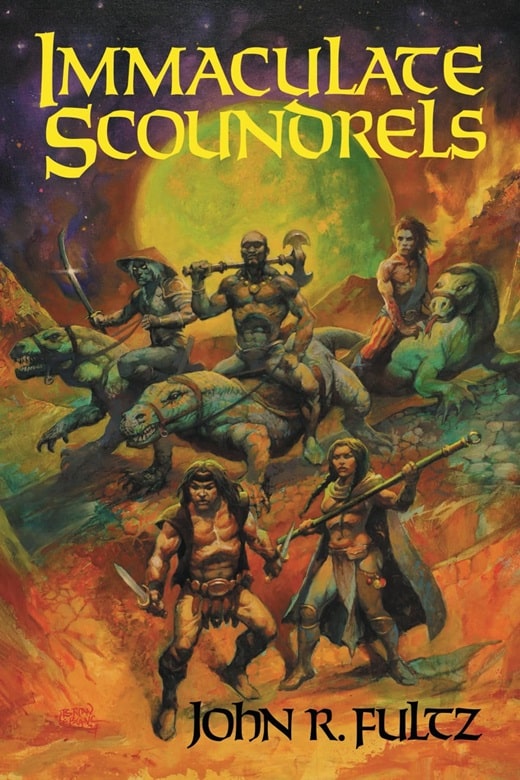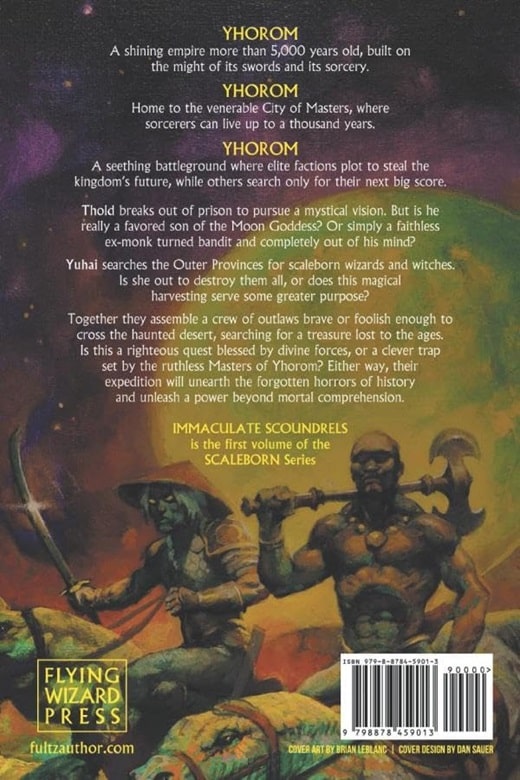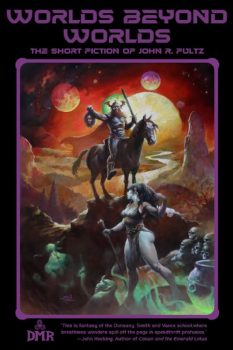Immaculate Scoundrels: That Tarantino-style Wuxia-80’s Heist-Fantasy Film… with Lizard People… you never knew you needed
 |
 |
Immaculate Scoundrels (Flying Wizard Press, March 5, 2024). Cover by Brian Leblanc
There are lots of jokes associated with being GenX; so many, in fact, that arguably, the best joke is being GenX, period. I mean, multiple discussions of various generations literally provided lists and manage to forget that there actually is a group of people born between 1965 and 1980 at all!
But thanks to the odd 80s nostalgia of Stranger Things, Maverick, and the never-ending exploitat… er… expansion of the Star Wars franchise… the rather odd era of Big Hair, Nuclear Escalation, the birth of the Summer Blockbuster and a lot of pretty bitchin’ music is in vogue. It was an interesting, weird and contradictory time to grow up, with a lot of contradictory media and mixed messages (I’ll never forget seeing a literal “Say No to Drugs” commercial attached to the trailer for Porkys).
The end result was a generation marked for having a certain feral cynicism born of constant reminder from about age 13 that we were the “baby bust” and had zero political or economic influence and likely never would so just “go do you.” And any inclination otherwise probably ended with the dot.com crash, 9/11 etc. all hitting as most of us were 25 – 33, with 1/2 the generation still on a Clintonian hangover and the other half still believing Reaganomics had been a thing.
(In fairness, it’s maybe easy to not have a generational agenda when there are only 12 of you, 4 are Michael J. Fox in Family Ties, four are characters from Friends, two thought Slackers was an aspirational documentary, and at least one OD’d on blow…)
For those of us who decided to do our Slacker best to just ignore the world listening to Judas Priest and reading fantasy novels, well, it was an equally weird time. The shelves were still filled with the classics of sword & sorcery, but the genre was entering its death-spiral by the mid-80s and the Big Fat Fantasy epic was the new thing. But in between that was a slimmer sort of fantasy, epic in story, but slim in page-count; the works of a number of brilliant women writers like Patricia McKillip, Nancy Springer and Jane Yolen.
As the 80s was also the era that loved its gratuitous sex scenes, writers like Andy Offutt and Robert E. Vardeman had similar offerings that combined a lot of the pacing and sexiness of sword & sorcery with an epic plot across three, four or five short novels. And this was all reflected in film, where for every Star Wars or Conan the Barbarian, there were a dozen, schlocky, straight to video, releases, that you knew would likely suck, but were going to watch anyway.
In a sense, though it was an incredibly creative foment: the steady deluge of badly translated kung fu cinema, cheap sword & sorcery films, action movies with insanely over the top plots… it was the visual media of the pulp magazines of 50 years earlier, and without the constant media deluge of the internet, a thriving book market of everything from quick, forgettable pocket books to bricks of “literature” you could use in self-defense.
 Born in 1969, John Fultz is clearly a product, prodigy, or victim, of this era, because his latest novel is more or less a complete distillation of a GenX fantasy nerd’s youth squeezed out onto the page into a bizarre gestalt of goofy goodness. Nor was it quite what I saw coming. An established author, whose has appeared in Year’s Best Weird Fiction, Weird Tales, Shattered Shields, Way of The Wizard, Book of Blades, Cthulhu’s Reign, The Book of Cthulhu II, That is Not Dead, Weirdbook, Black Gate, Lightspeed, The Audient Void, and Space & Time, et. al., his work probably most often fits into either the mold of dark fantasy, as seen in the recent collection, Worlds Beyond Worlds from DMR Books or The Revelations Of Zang (2013), or horror, as in Darker Than Weird from Jackanapes Press collects ten years’ worth of weird horror tales. But this latest novel is… something different.
Born in 1969, John Fultz is clearly a product, prodigy, or victim, of this era, because his latest novel is more or less a complete distillation of a GenX fantasy nerd’s youth squeezed out onto the page into a bizarre gestalt of goofy goodness. Nor was it quite what I saw coming. An established author, whose has appeared in Year’s Best Weird Fiction, Weird Tales, Shattered Shields, Way of The Wizard, Book of Blades, Cthulhu’s Reign, The Book of Cthulhu II, That is Not Dead, Weirdbook, Black Gate, Lightspeed, The Audient Void, and Space & Time, et. al., his work probably most often fits into either the mold of dark fantasy, as seen in the recent collection, Worlds Beyond Worlds from DMR Books or The Revelations Of Zang (2013), or horror, as in Darker Than Weird from Jackanapes Press collects ten years’ worth of weird horror tales. But this latest novel is… something different.
The title, Immaculate Scoundrels, is one of those tricky oxymoronic-sounding tongue twisters that at first dares you to define what it means yet seems to suggest that it means exactly something. It perhaps reminds of the eponymous, Inglorious Bastards of Quentin Tarantino fame, and that comparison would be apt. For Fultz, like Tarantino, has stuffed his psyche to Baron Harkonnen proportions on a diet of pulp fiction in all its glorious forms and media: From sword & sorcery to wuxia fantasy, from hardboiled noir in the mean streets of the big city to the dusty plains and desolate streets that populate Westerns of the late 50s and 60s, encapsulated best in the works of Leone, Peckinpah and Boetticher, only I suspect it was written to a soundtrack of Iron Maiden, Judas Priest and maybe a little surf guitar besides.
Much like Tarantino, at his best, takes those youthful loves and elevates his creations from homage into something strange and new, with the start of the Scaleborn Saga, Fultz is… well… just what IS he doing?
 In form, this is a “caper” or heist story; a kung fu Treasure of the Sierra Madre populated by your favorite D&D adventurers, where the pure-bred humans are both ascendant, and the bad guys… the Scaleborn, a mestizo offspring of an all-but extinct lizard/snake people (the stock baddies in so much Sword & Sorcery since Robert E. Howard’s “The Shadow Kingdom”), the sympathetic underdogs.
In form, this is a “caper” or heist story; a kung fu Treasure of the Sierra Madre populated by your favorite D&D adventurers, where the pure-bred humans are both ascendant, and the bad guys… the Scaleborn, a mestizo offspring of an all-but extinct lizard/snake people (the stock baddies in so much Sword & Sorcery since Robert E. Howard’s “The Shadow Kingdom”), the sympathetic underdogs.
But that’s really only giving you a fast and dirty drop off into this world and this story, which feels a lot like the distillation of the fantasy that Fultz and I, were growing up with — where lean, tight sword & sorcery sat on the shelf next to brick-sized epic fantasy and some writers, such as Glen Cook, wrote series and trilogies that straddled the two worlds, with tight efficient world-building that required the reader’s attention and imagination, not a 50 page glossary, and often began small in scope and built steadily in scale.
Our Scoundrels are four principal characters:
Thold — scaleborn warrior, thief and possible madman, recently ‘restored’ to sanity by an unknown goddess who wants him to travel to the ruins of the lost Montari (serpent folk) city to liberate a lost treasure…as one does.
Yuhai — a scaleborn witch of minor power in service to the human Empress, sent on a mission to find and “collect” other scaleborn witches of considerably more talent than herself and bring them to the imperial court, whether they will or no. Although no great magician, Yuhai has a spirit-filled staff and collection of alchemical potions that make Batman’s utility belt seem skimpy.
Niro Vont — a demon-possessed captain in the Scaleborn Legion and master swordsman. Did I mention that demon mostly just likes killing… everything it encounters?
Yett — a teenager and exiled novice equivalent to the Shaolin monks, not of reality, but the best of wuxia theater, cast out for having loved another novice.
There is a wider cast, but most of the viewpoint and narrative is through the lens of these four characters, and it is the collision of their roads that sets both this story, and the larger arc revealed in the final chapter, into motion.
As I’ve said, at its root, this is a heist novel, and ostensibly, the plot revolves around Thold’s original plan, though each of the other scoundrels has their own reasons for accompanying him, and those plot points I’ll leave for the reader to discover. Let’s just say that certainly no one is safe, and one should expect a high body count. In a world with sorcerer’s who can prolong their lives for hundreds of years, obliterate cities and use slave soldiers to fight their wars, life is far from fair, and death comes swift and sudden — even to those we’ve come to think of as heroes.
Fultz clearly enjoys writing his battle scenes and there are moments that feel straight out of a kung fu film (or a 60s Western) where the good guys are surrounded by impossible odds, everyone is breathing heavy, there are close-ups of people’s faces, and you know the s@!it is about to go down. There is one such scene, late in the novel, that is at least worthy of the battle of the Crazy 88 from Kill Bill and I am pretty sure that Dave Murray or Lemmy were jamming as Fultz was typing.
Basically, this novel is what all of us growing up in the 80s kept hoping those crappy, cheaply fantasy films might turn out to be, and never were, crossed with what we thought our D&D adventures were like… only we were 12. If you’re of a certain generation, you’re going to have fun for the same reasons Stranger Things and Cobra Kai are fun.
But this is also a very contemporary work, not just homage or nostalgia; the writing style is current, Fultz has no problem introducing queer characters as needed as fully realized characters (rather than as oddities or novelties, as they so often were in our youth), and his female protagonist shares center-stage with her male counterpart. The end result is that Immaculate Scoundrels is both a love song to what Fultz and I grew up with and a contemporary work that succeeds as contemporary fantasy, albeit of a style we aren’t seeing much of currently.
This is a fun book that knows exactly what it is setting out to do and does it. The finale resolves in a reveal that elevates the story from episode to larger tale and also casts one of the main character’s entire set of actions and motivations in a new light.
Greg Mele lives in Illinois. His last article for us was a review of the Conan story The Shadow of Vengeance by Scott Oden.
Sold!
Planning on delving into this when I get back from hiking!
I’m Genx too and I’m so on board with this!! I got the Kindle version when it dropped but I’ve been reading the anthology, Neither Beg Nor Yield.
Based on what you just wrote, Immaculate Scoundrels just got moved up to next in the queue.
Great review, Greg! Entertaining and illuminating. I’m definitely reading John’s new book.